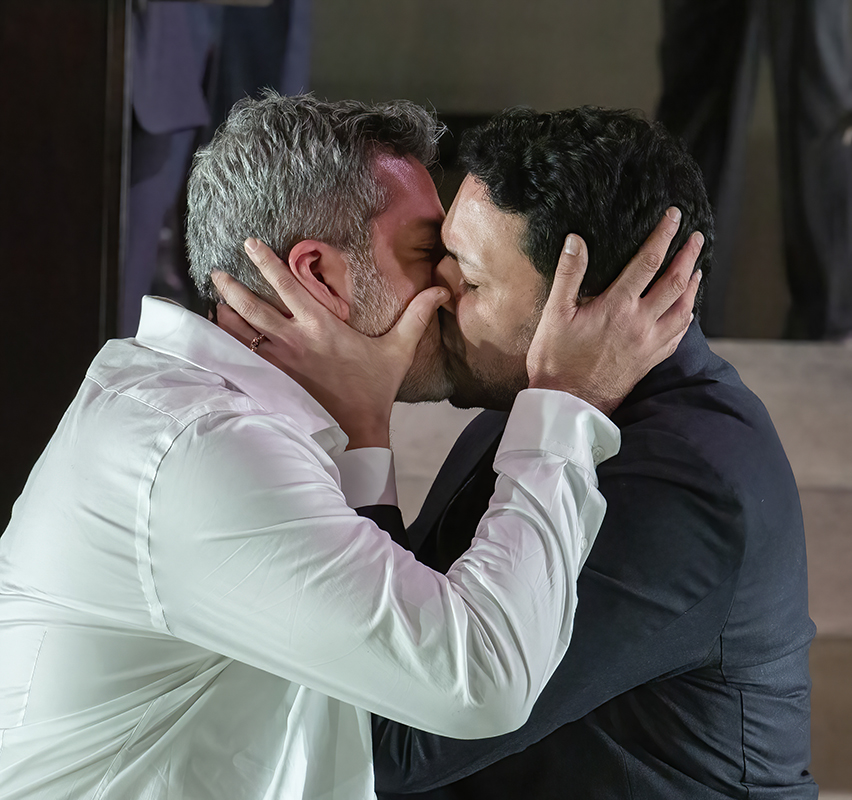Stage Review: ‘The Merchant of Venice’ Takes A Gay Path To Tragedy
Plumbing the homoerotic tendencies in the text, Arin Arbus' 'The Merchant of Venice' at D.C.'s Shakespeare Theatre unearths a fresh take.

Shakespeare might have left it open for debate whether Antonio and Bassanio in The Merchant of Venice share an affection like friends, like father and son, or like “bosom lovers,” but the play leaves no question that, for Antonio, Bassanio’s happiness is worth risking riches, reputation, and a pound of flesh.
The script implies much in the pair’s intense devotion, and director Arin Arbus’ boldly queer production of The Merchant of Venice (★★★★☆) at the Shakespeare Theatre Company merely makes their attraction plain. Alfredo Narciso as Antonio and Sanjit De Silva as Bassanio cast a riveting spell as paramours who have reached a crossroads, now that Bassanio yearns to marry the heiress Portia (Isabel Arraiza).
To ensure his beloved Bassanio is set up financially for marriage, Antonio will stake his own funds and flesh, striking a deal with a Jewish moneylender whom he despises. Shylock, portrayed with vigor and poignant vulnerability by John Douglas Thompson, is thus pitted as the villain against Antonio, a Christian who openly expresses his contempt for Jews, and yet, who, as we can see, also struggles to accept every part of himself.
Antonio’s nasty antisemitism seems that much more complicated in a scenario where he’s clearly held back by societal prejudices and pressures that apply to other tribes. By a similar token, Portia’s lot as “a living daughter curbed by the will of a dead father” captures the cultural barriers that have held women back for centuries.
She responds by usurping a taste of male power with a brazen act of roleplay, while Shylock responds to being called a dog, spit on, and humiliated by insisting on taking exactly the debt he feels is owed to him — by both Antonio and the world.

Portia and Shylock both plead for human rights, for acceptance, mercy, and justice. Arraiza’s Portia, resourceful and aware, is mildly persuasive delivering her “quality of mercy” monologue, and Thompson, a Black actor tapping into layers of meaning playing the world-weary Jew, lends a powerful authority to Shylock’s “Hath not a Jew eyes” speech.
The entire production asserts a keenly observed case for treating all people equally, regardless of religion, race, gender, or sexuality.
Antonio and Bassanio carry the play’s sense of hope and romance, with Narciso compellingly conflicted as the merchant brought low by debt (and heartbreak), but not so low that he can’t still disparage the Jew.
While De Silva is particularly well-pitched in playing Bassanio’s humor and charm, Haynes Thigpen delights as a larger-than-life Gratiano, and Shirine Babb offers feisty support, with deft non-verbal touches, as Portia’s lady-in-waiting Nerissa.
Most of the cast wields the language in a natural style to match the modern-dress setting, elegantly presented on scenic designer Riccardo Hernandez’s stark, marbled stage. Acclaimed Shakespearean Thompson, however, takes a more traditional approach, which works just fine for him and the production, because he grips every word like a master.
With Thompson’s powerful performance and a few bold strokes, Arbus’ production reveals disparate swaths of humanity demanding their pound of flesh and proper measures of dignity and respect.
The Merchant of Venice runs until April 24 at Michael R. Klein Theatre, 450 7th St NW. Tickets are $35-120, with premium seating also available for weekend performances. Call (202)547-1122, or visit www.ShakespeareTheatre.org.
Support Metro Weekly’s Journalism
These are challenging times for news organizations. And yet it’s crucial we stay active and provide vital resources and information to both our local readers and the world. So won’t you please take a moment and consider supporting Metro Weekly with a membership? For as little as $5 a month, you can help ensure Metro Weekly magazine and MetroWeekly.com remain free, viable resources as we provide the best, most diverse, culturally-resonant LGBTQ coverage in both the D.C. region and around the world. Memberships come with exclusive perks and discounts, your own personal digital delivery of each week’s magazine (and an archive), access to our Member's Lounge when it launches this fall, and exclusive members-only items like Metro Weekly Membership Mugs and Tote Bags! Check out all our membership levels here and please join us today!




















